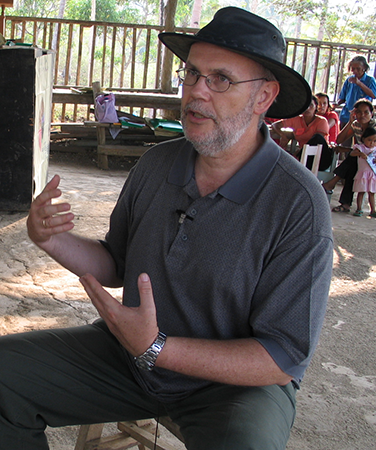Reliving the Nightmare: When a Revolutionary Movement Goes Wrong
/Book Review: Paraiso by Christoph Dehn. Manila and Germany: Optima Typographics. 2025.
Author Christoph Dehn
It turns out to be neither a simple nor happy reunion. With Diwa taking her time to reconnect, Jan ends up spending time with their mutual friends. It is in these side stories that Dehn returns us to the tragedy that ended the Communist movement’s remarkable growth during the Marcos dictatorship: the internal purges of the late 1980s.
Most of those Jan reconnected with had resigned, been ousted, or had simply abandoned the Party. In the past, they shared with Jan stories of their radicalization—whether through experiencing poverty firsthand, witnessing military atrocities, or engaging with the writings of Karl Marx—and their unwavering, uncompromising commitment to social change.
This time, the conversation is about being arrested by one’s own comrades and accused of treachery and betrayal of the Party that caused the death of many members. There is Kaloy, who confesses to having being drawn to the idea of becoming “a martyr and hero of the revolution.” He muses to Jan that with his death, the New People’s Army (NPA) leadership “would name a guerrilla unit after me, and later, perhaps a street in my hometown.” Jan quietly admits that it was “youthful megalomania, revolutionary kitsch,” but understandable because cadres like Kaloy lived under the constant, tangible threat of death.
Kaloy’s daydreaming was abruptly shattered when, upon arriving at an NPA camp in Negros, he was arrested “on behalf of the Communist Party of the Philippines.” They hogtied him and handed him over to a short comrade with cold hatred in his eyes. Between beatings, the man accused him of being a military spy. Kaloy was bewildered.
“I couldn’t understand what was happening. It felt like I was in a trance, not in this world. In my head, words and sentences tumbled over each other: I am not here. This is not happening to me. I am a good comrade. I am innocent. I’ve given my whole life to the revolution. Untie me. I have work to do. You’re desecrating the revolution.”
Ironically, it was Bernie—one of the interrogators—who saved Kaloy. He grew a conscience after witnessing another comrade club a prisoner on the head. “It sounded like smashing a melon—no, a coconut,” Kaloy later recalls, “dull and deep and final.” Horrified, Bernie quietly smuggled the badly tortured Kaloy out of the camp. Kaloy left the movement.
Bernie stayed “to stop the madness of the purges,” he said, and to ensure some form of atonement: for the families, the survivors, and the dead of Camp 49. But that never happened. There was no collective admission of guilt, no apology. The torture and killings were pinned on a few “deviationists” and rogue elements. Some were quietly expelled or demoted, but by 1992, it was clear that the Party leadership simply wanted to move on.
Jan also learns of the death of Maria, a well-respected NGO (non-government organization) leader and, secretly, a CPP cadre, long believed to have been killed by the military. But the story takes a darker, more convoluted turn. Maria’s office had been funneling millions in international aid to the CPP through schemes that wouldn’t be out of place in a traditional politician’s patronage network. Identical grant proposals were submitted to multiple development agencies, each led to believe they were the NGO’s sole funder. There was also the usual inflation of expense receipts, along with the creation of a ghost people’s organization to justify the disbursement of funds.
Maria, however, had other plans. She and a collaborator, the Protestant bishop who chaired the NGO, skimmed off the already embezzled funds (about P26M out of the P50-60M!). The bishop then committed suicide not because of guilt over the money he and Maria stole but for having a mistress, and Maria, it turned out, died not by a military ambush but in the hands of her comrades. She was arrested and tortured for stealing from the Party. Diwa, the accountant sent by the Party to investigate the corruption, was the key witness.
Paraiso by Christoph Dehn.
But there was yet another twist. Diwa discovered that the Party had already decided to execute Maria as soon as it recovered the embezzled funds. After leaving the camp, Diwa appealed to higher-ups, going as far as Utrecht, where the Party’s founding chairman continued to issue edicts from exile. She received no reply. Soon after, word came of Maria’s death. Diwa, Jan, and a few others eventually located her decomposing body in a shallow grave.
Diwa left the CPP after that. She and Jan slowly drifted apart.
Until Jan returns “to finish an old story.” But as it turns out, Diwa is a story in herself, someone who offers a quiet, piercing glimpse into what it means when a revolution consumes one’s life. She opens up to Jan about her love life:
“Marriage was never really part of my agenda. I had dedicated my life to the revolution. I made a serious effort to love the people. To be honest, I didn’t succeed very well. I loved my friends. I met people in the movement who impressed me deeply with their clarity, their determination, their courage and devotion. I loved those people.”
But.
“The people were abstract. I was content to love outstanding members of the people. Love that means that I was attracted to them, that I sought their closeness and their recognition, that I asked them for advice. This love tied me more closely to the revolution. Above our love was the radiant future of national liberation. There was no place for romantic love, tenderness, whispering, and holding hands in love in my idea of a meaningful and fulfilled life.”
She hadn’t married out of romantic infatuation, but because she and her partner, both being revolutionaries, shared a “solid foundation.” Together, they became, as she put it, “a perfectly coordinated machinery,” like “two parts of the same organism.” It was the Party’s collective life, distilled into marriage. Even her husband’s death at the hands of the military didn’t shake that belief.
What finally did was Maria.
But what struck me most about Dehn’s book is how powerfully he captures the tangled, often painful lives of Filipino communists.
Only then did Diwa begin to break away from the Party’s rigid notions of love, and from the cold, traditional Catholic ideal of duty-bound marriage she had unconsciously mirrored. And the first thing she did with that newfound freedom was to have an intense, fleeting one-night stand with Kaloy.
I’ll leave the ending of the novel for readers to discover. But what struck me most about Dehn’s book is how powerfully he captures the tangled, often painful lives of Filipino communists—from their fierce, focused commitment in the early days, to the bewilderment, despondency, and quiet regret that followed the Party purges and internecine splits.
At its heart, the novel follows a group of former cadres trying to make sense of their lives after their sans-culottes days had ended. In the process, they turned Dehn—through his narrator, Jan—into something like a confessor. The one entrusted with their stories. First for Germans and Europeans. And now, through this English translation, for the rest of the world.
The deeper question the novel raises echoes what Hilary Mantel calls “the secret history of the revolution”—the shadowy underworld of spies, fixers, and financial manipulation that, alongside the political officer turned torturer, ultimately corrodes and undermines every revolution, including the Philippine national democratic movement.
But this is, after all, the world of fiction. Perhaps historians will now want to investigate whether these events truly unfolded in real life. Judging by the tone of Robert Francis Garcia’s preface—the author of the heart-rending To Suffer Thy Comrade: How the Revolution Decimated Its Own—there are strong indications that Dehn’s novel closely mirrors the truth.
Paraiso can be ordered through PGX Fair Trade Market in the Philippines (https://www.facebook.com/pgxfairtrademarket/).
Patricio N. Abinales retired from the Department of Asian Studies, University of Hawai'i-Manoa. He is writing a book on the University of the Philippines and the Marcos dictatorship.
More articles from Patricio Abinales





